
Distant Education College.Jilin University Lesson 8 How to Guess Your Age 1.Background Knowledge 2.Text Ana vsis 3.Exercises 4.Questrons For iscussion ewwe鬼ao4p3见见y
Lesson 8 How to Guess Your Age 1. Background Knowledge 2. Text Analysis 3. Exercises 4. Questions For Discussion Distant Education College, Jilin University Extensive Reading III
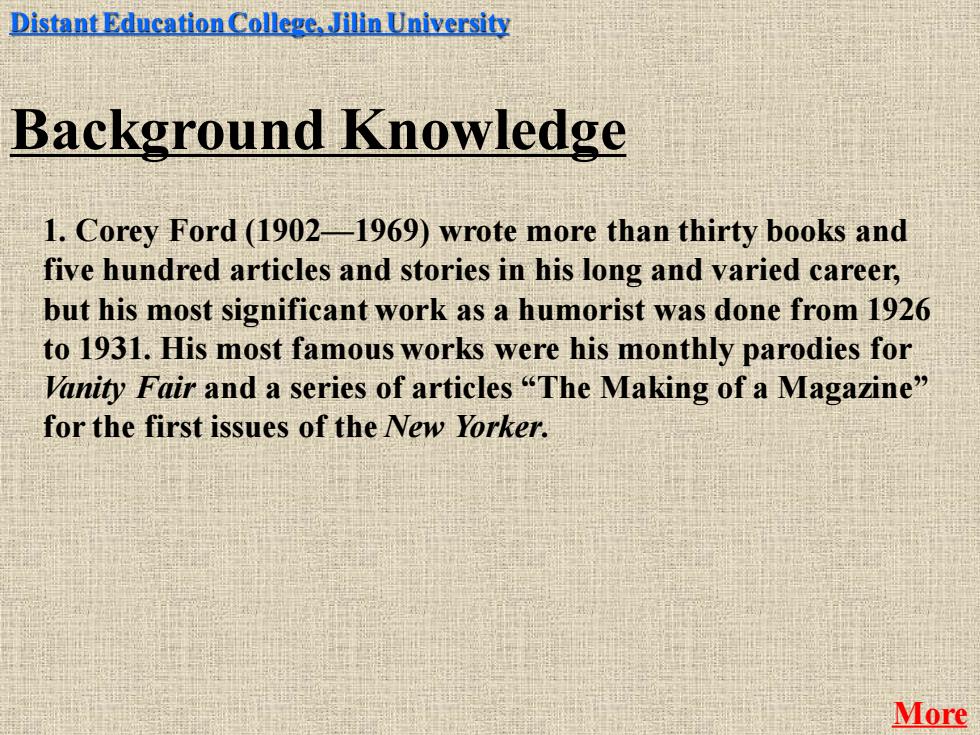
Distant Education College,Jilin University Background Knowledge 1.Corey Ford (1902-1969)wrote more than thirty books and five hundred articles and stories in his long and varied career, but his most significant work as a humorist was done from 1926 to 1931.His most famous works were his monthly parodies for Vanity Fair and a series of articles "The Making of a Magazine" for the first issues of the New Yorker. More
Background Knowledge Distant Education College, Jilin University 1. Corey Ford (1902—1969) wrote more than thirty books and five hundred articles and stories in his long and varied career, but his most significant work as a humorist was done from 1926 to 1931. His most famous works were his monthly parodies for Vanity Fair and a series of articles “The Making of a Magazine” for the first issues of the New Yorker. More
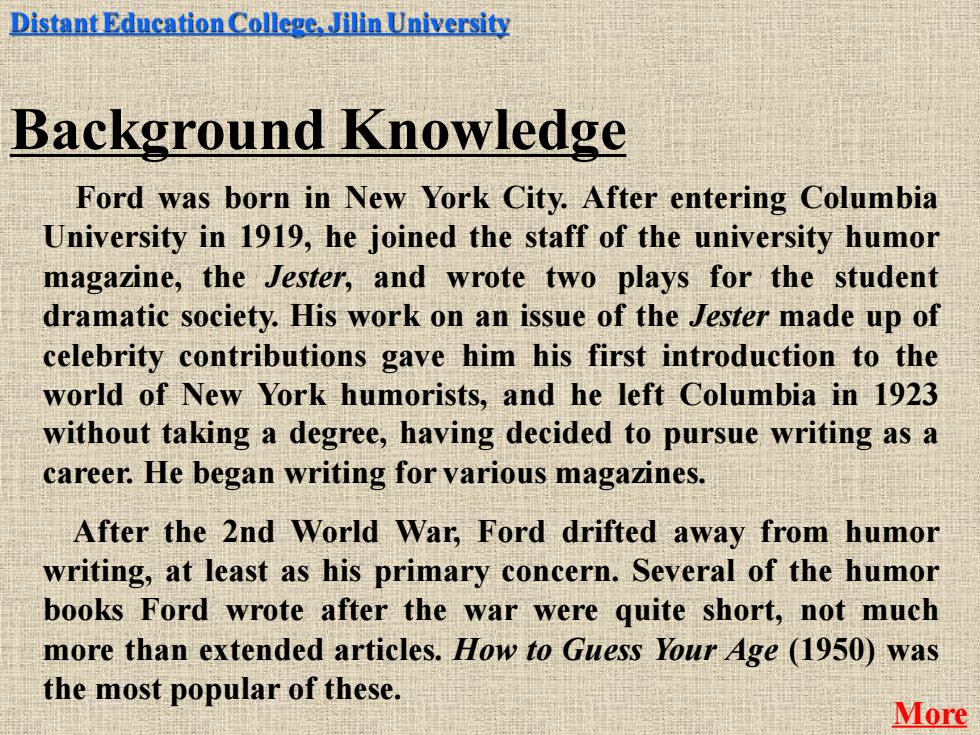
Distant Education College Jilin University Background Knowledge Ford was born in New York City.After entering Columbia University in 1919,he joined the staff of the university humor magazine,the Jester,and wrote two plays for the student dramatic society.His work on an issue of the Jester made up of celebrity contributions gave him his first introduction to the world of New York humorists,and he left Columbia in 1923 without taking a degree,having decided to pursue writing as a career.He began writing for various magazines. After the 2nd World War,Ford drifted away from humor writing,at least as his primary concern.Several of the humor books Ford wrote after the war were quite short,not much more than extended articles.How to Guess Your Age (1950)was the most popular of these. More
Ford was born in New York City. After entering Columbia University in 1919, he joined the staff of the university humor magazine, the Jester, and wrote two plays for the student dramatic society. His work on an issue of the Jester made up of celebrity contributions gave him his first introduction to the world of New York humorists, and he left Columbia in 1923 without taking a degree, having decided to pursue writing as a career. He began writing for various magazines. After the 2nd World War, Ford drifted away from humor writing, at least as his primary concern. Several of the humor books Ford wrote after the war were quite short, not much more than extended articles. How to Guess Your Age (1950) was the most popular of these. Background Knowledge Distant Education College, Jilin University More
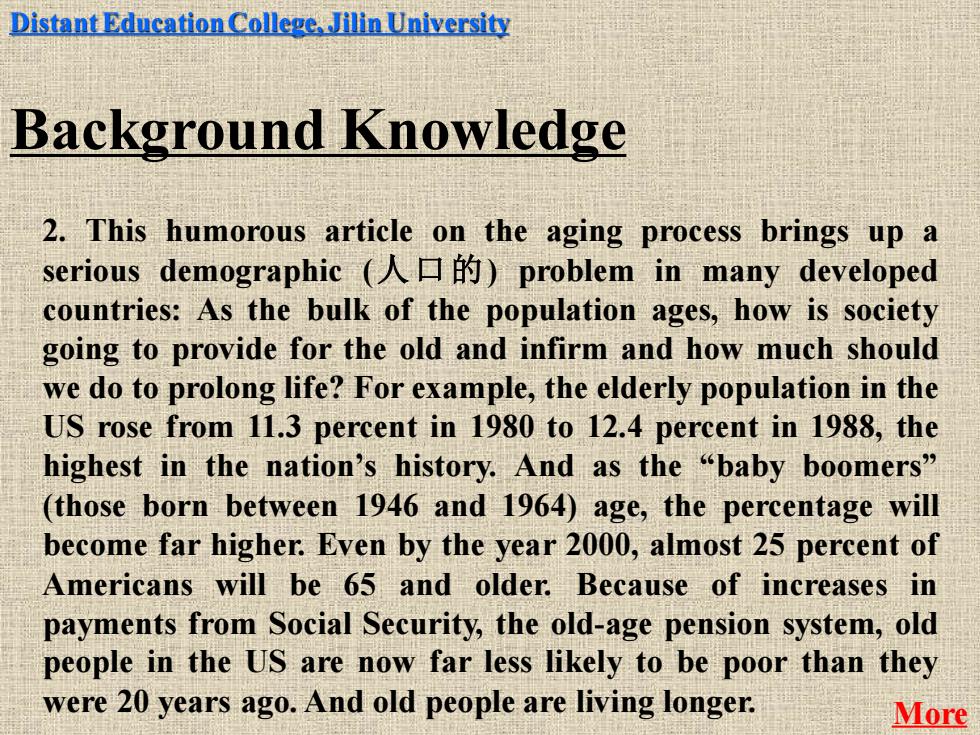
Distant Education College Jilin University Background Knowledge 2.This humorous article on the aging process brings up a serious demographic(人▣t的)problem in many developed countries:As the bulk of the population ages,how is society going to provide for the old and infirm and how much should we do to prolong life?For example,the elderly population in the US rose from 11.3 percent in 1980 to 12.4 percent in 1988,the highest in the nation's history.And as the "baby boomers" (those born between 1946 and 1964)age,the percentage will become far higher.Even by the year 2000,almost 25 percent of Americans will be 65 and older.Because of increases in payments from Social Security,the old-age pension system,old people in the US are now far less likely to be poor than they were 20 years ago.And old people are living longer. More
2. This humorous article on the aging process brings up a serious demographic (人口的) problem in many developed countries: As the bulk of the population ages, how is society going to provide for the old and infirm and how much should we do to prolong life? For example, the elderly population in the US rose from 11.3 percent in 1980 to 12.4 percent in 1988, the highest in the nation’s history. And as the “baby boomers” (those born between 1946 and 1964) age, the percentage will become far higher. Even by the year 2000, almost 25 percent of Americans will be 65 and older. Because of increases in payments from Social Security, the old-age pension system, old people in the US are now far less likely to be poor than they were 20 years ago. And old people are living longer. Background Knowledge Distant Education College, Jilin University More
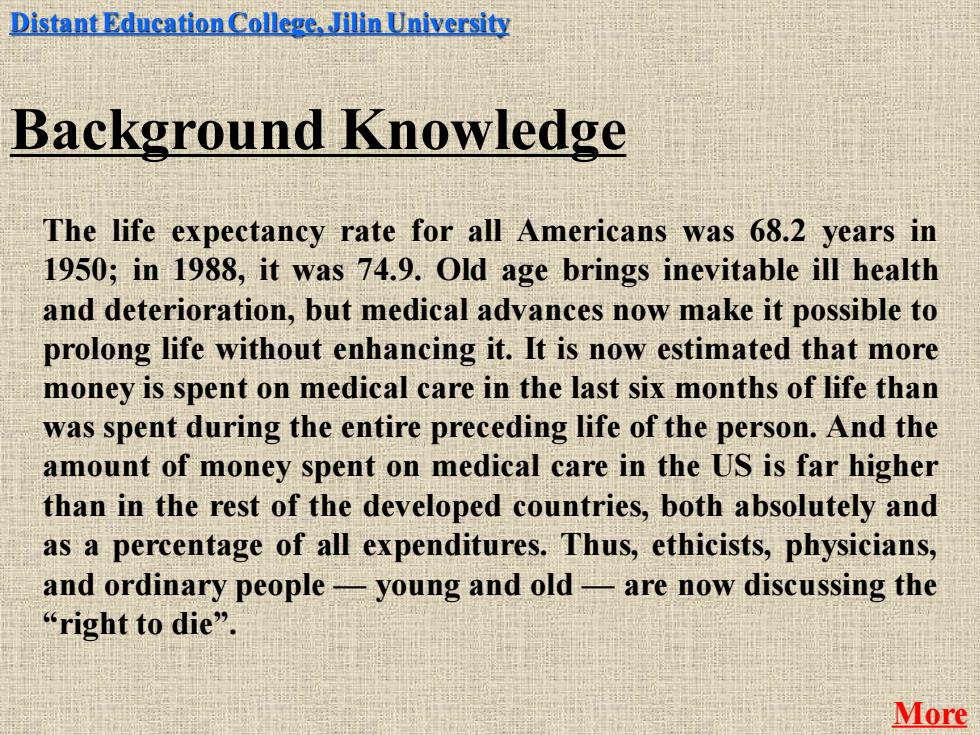
Distant Education College,Jilin University Background Knowledge The life expectancy rate for all Americans was 68.2 years in 1950;in 1988,it was 74.9.Old age brings inevitable ill health and deterioration,but medical advances now make it possible to prolong life without enhancing it.It is now estimated that more money is spent on medical care in the last six months of life than was spent during the entire preceding life of the person.And the amount of money spent on medical care in the US is far higher than in the rest of the developed countries,both absolutely and as a percentage of all expenditures.Thus,ethicists,physicians, and ordinary people-young and old-are now discussing the “right to die'”. More
The life expectancy rate for all Americans was 68.2 years in 1950; in 1988, it was 74.9. Old age brings inevitable ill health and deterioration, but medical advances now make it possible to prolong life without enhancing it. It is now estimated that more money is spent on medical care in the last six months of life than was spent during the entire preceding life of the person. And the amount of money spent on medical care in the US is far higher than in the rest of the developed countries, both absolutely and as a percentage of all expenditures. Thus, ethicists, physicians, and ordinary people — young and old — are now discussing the “right to die”. Background Knowledge Distant Education College, Jilin University More
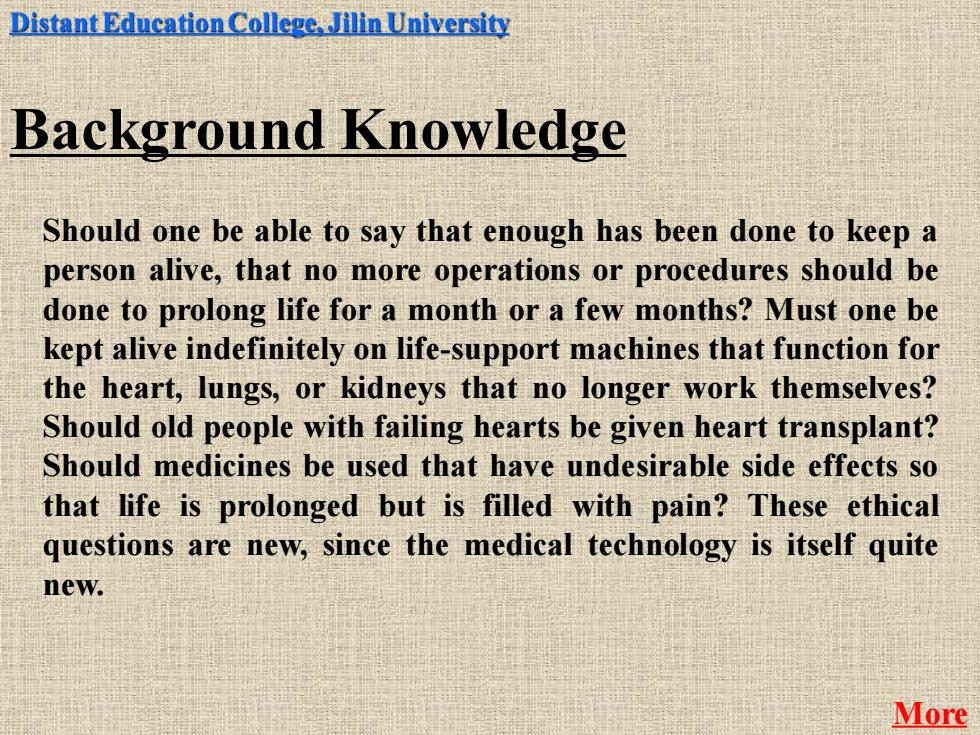
Distant Education College,Jilin University Background Knowledge Should one be able to say that enough has been done to keep a person alive,that no more operations or procedures should be done to prolong life for a month or a few months?Must one be kept alive indefinitely on life-support machines that function for the heart,lungs,or kidneys that no longer work themselves? Should old people with failing hearts be given heart transplant? Should medicines be used that have undesirable side effects so that life is prolonged but is filled with pain?These ethical questions are new,since the medical technology is itself quite new. More
Should one be able to say that enough has been done to keep a person alive, that no more operations or procedures should be done to prolong life for a month or a few months? Must one be kept alive indefinitely on life-support machines that function for the heart, lungs, or kidneys that no longer work themselves? Should old people with failing hearts be given heart transplant? Should medicines be used that have undesirable side effects so that life is prolonged but is filled with pain? These ethical questions are new, since the medical technology is itself quite new. Background Knowledge Distant Education College, Jilin University More
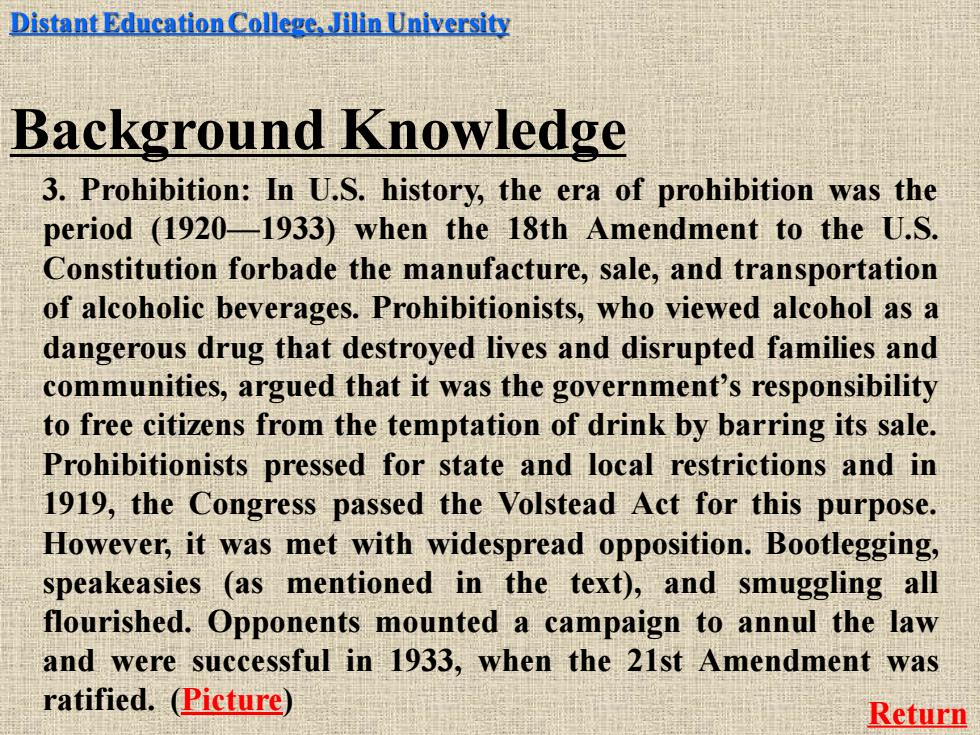
Distant Education College,Jilin University Background Knowledge 3.Prohibition:In U.S.history,the era of prohibition was the period (1920-1933)when the 18th Amendment to the U.S. Constitution forbade the manufacture,sale,and transportation of alcoholic beverages.Prohibitionists,who viewed alcohol as a dangerous drug that destroyed lives and disrupted families and communities,argued that it was the government's responsibility to free citizens from the temptation of drink by barring its sale. Prohibitionists pressed for state and local restrictions and in 1919,the Congress passed the Volstead Act for this purpose. However,it was met with widespread opposition.Bootlegging, speakeasies (as mentioned in the text),and smuggling all flourished.Opponents mounted a campaign to annul the law and were successful in 1933,when the 21st Amendment was ratified.(Picture) Return
3. Prohibition: In U.S. history, the era of prohibition was the period (1920—1933) when the 18th Amendment to the U.S. Constitution forbade the manufacture, sale, and transportation of alcoholic beverages. Prohibitionists, who viewed alcohol as a dangerous drug that destroyed lives and disrupted families and communities, argued that it was the government’s responsibility to free citizens from the temptation of drink by barring its sale. Prohibitionists pressed for state and local restrictions and in 1919, the Congress passed the Volstead Act for this purpose. However, it was met with widespread opposition. Bootlegging, speakeasies (as mentioned in the text), and smuggling all flourished. Opponents mounted a campaign to annul the law and were successful in 1933, when the 21st Amendment was ratified. (Picture) Background Knowledge Distant Education College, Jilin University Return

Distant Education College,Jilin University Questions for Discussion 1.Were you ever bewildered by the adult world when you were in your childhood? 2.As you grow up,do you notice any difference between how you used to understand things and how you do now? Return
1. Were you ever bewildered by the adult world when you were in your childhood? 2. As you grow up, do you notice any difference between how you used to understand things and how you do now? Questions for Discussion Distant Education College, Jilin University Return
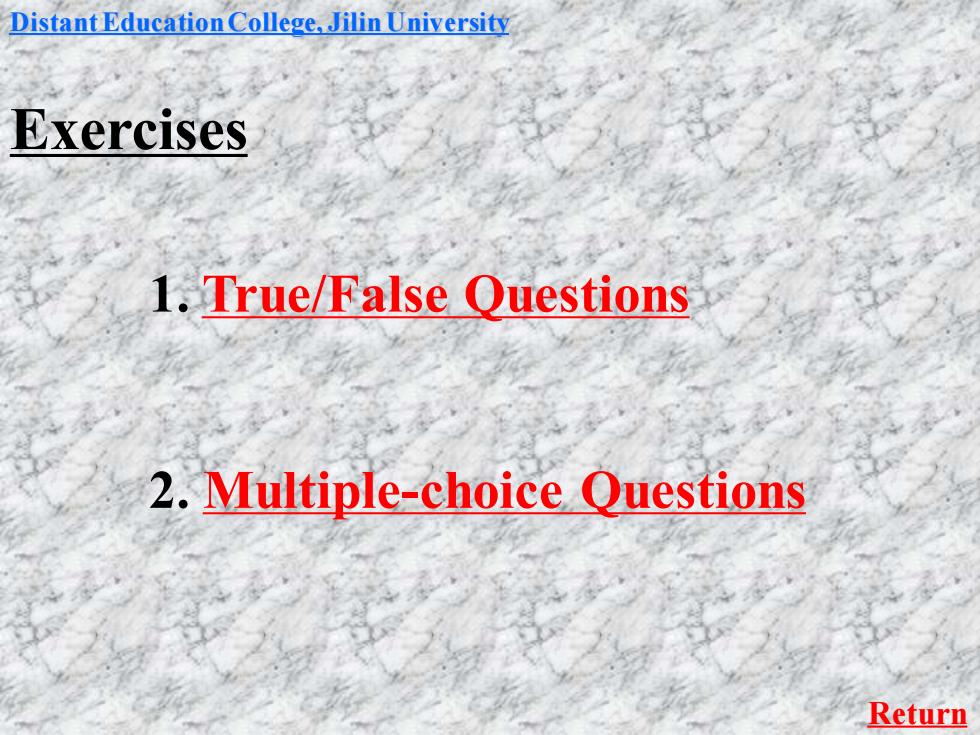
Distant Education College,Jilin University Exercises 1.True/False Questions 2.Multiple-choice Questions Return
1. True/False Questions 2. Multiple-choice Questions Exercises Distant Education College, Jilin University Return
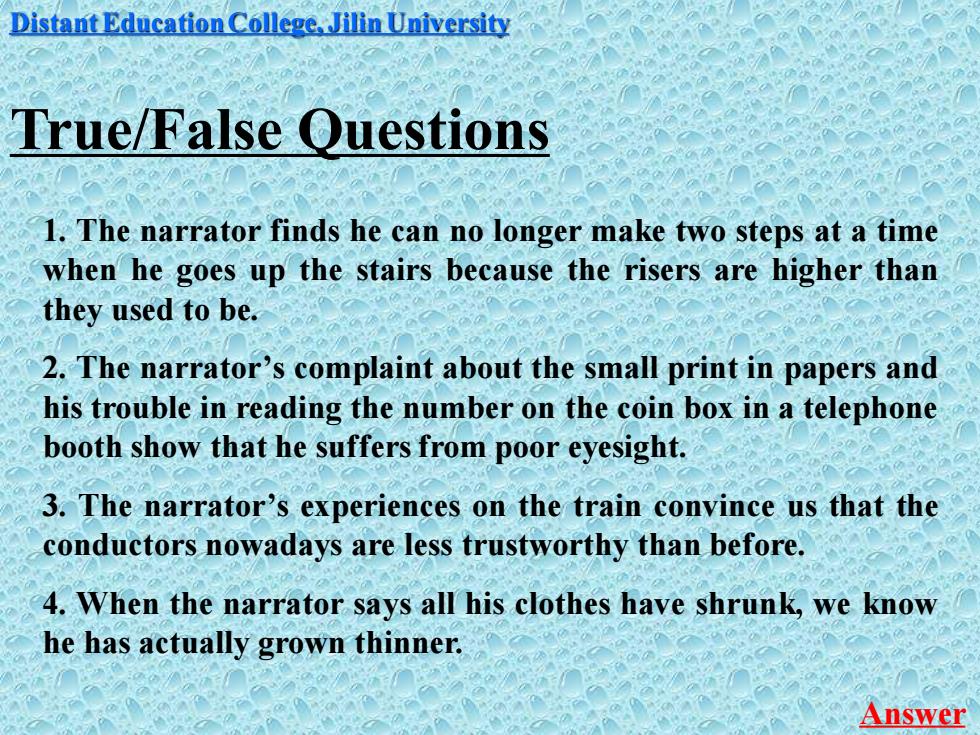
Distant Education College,Jilin University True/False Questions 1.The narrator finds he can no longer make two steps at a time when he goes up the stairs because the risers are higher than they used to be. 2.The narrator's complaint about the small print in papers and his trouble in reading the number on the coin box in a telephone booth show that he suffers from poor eyesight. 3.The narrator's experiences on the train convince us that the conductors nowadays are less trustworthy than before. 4.When the narrator says all his clothes have shrunk,we know he has actually grown thinner. Answer
1. The narrator finds he can no longer make two steps at a time when he goes up the stairs because the risers are higher than they used to be. 2. The narrator’s complaint about the small print in papers and his trouble in reading the number on the coin box in a telephone booth show that he suffersfrom poor eyesight. 3. The narrator’s experiences on the train convince us that the conductors nowadays are less trustworthy than before. 4. When the narrator says all his clothes have shrunk, we know he has actually grown thinner. True/False Questions Distant Education College, Jilin University Answer